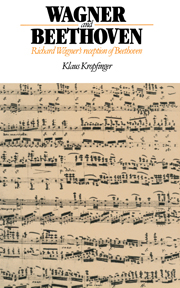Book contents
- Frontmatter
- Contents
- Preface
- Additional acknowledgements
- German and English abbreviations
- 1 Introduction
- 2 Wagner's experience of Beethoven
- 3 The Romantic background and Beethoven biography
- 4 Beethoven's role in Wagner's writings on art
- 5 Wagner's theory and construction of music drama
- 6 Wagner as Beethoven's heir
- Notes
- Bibliography
- Index of names
- Index of subjects
6 - Wagner as Beethoven's heir
Published online by Cambridge University Press: 21 May 2010
- Frontmatter
- Contents
- Preface
- Additional acknowledgements
- German and English abbreviations
- 1 Introduction
- 2 Wagner's experience of Beethoven
- 3 The Romantic background and Beethoven biography
- 4 Beethoven's role in Wagner's writings on art
- 5 Wagner's theory and construction of music drama
- 6 Wagner as Beethoven's heir
- Notes
- Bibliography
- Index of names
- Index of subjects
Summary
Wagner's philosophy of history
The three stages of history
Wagner saw history from the viewpoint of the evolving history of the arts. This he envisaged as a progression in three stages, which he described as follows: (I) the arts are united in the ‘total art-work of tragedy’ (GSiii, p. 12); 2(i) the ‘decline of tragedy’, entailing the dissolution of the original unity of the arts, and (ii) a ‘renaissance of the arts’ (GSiii, p. 29) ‘among the Christian nations of Europe’ (GSvii, p. 105); (3) at a new and final stage in history the original unity is regained in the ‘art-work of the future’. Wagner deals with this in Parts ii and iii of Opera and Drama in particular.
In his account of the first historical stage and its decline, Wagner makes it clear that his concept of art is bound up with a concept of society:
For through the medium of tragedy he [the Ancient Greek] rediscovered himself–the noblest part of his being, which was combined with the noblest parts of the whole nation's collective being … The decline of tragedy is intimately connected with the dissolution of the Athenian city-state. Just as the spirit of unity divided into a thousand and one egoistic impulses, so the great ‘Gesammtkunstwerk’ of tragedy was broken down into its separate, inbuilt artistic components…
(GSiii, p. 12)A notable feature of Wagner's second stage is that with the development of the individual arts, there was a gradual emergence of trends that represented a mutual drawing together.
- Type
- Chapter
- Information
- Wagner and BeethovenRichard Wagner's Reception of Beethoven, pp. 243 - 253Publisher: Cambridge University PressPrint publication year: 1991



